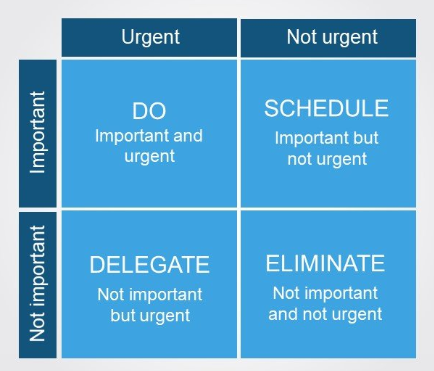Better Project Management Practices
Urgent versus important – it’s a daily dilemma that we all strive to balance, especially when it comes to critical IT infrastructure. Urgent activities simply demand immediate attention and rely on a reactive and hurried mindset. Important tasks will usually contribute to long term benefits and objectives and usually require a disciplined and proactive focus. Yet most of us fall into the trap of believing that urgent activities are also important – probably a throwback to a time when life and death relied more on short term concerns – and now a modern world that constantly bombards us with increasingly more information only serves to heighten our already ingrained mindset.
Of course, Dwight D Eisenhower tried to help us differentiate between urgent and important using the Eisenhower Matrix, a matrix designed to help you decide on and prioritise tasks by urgency and importance, sorting out less urgent and important tasks which you should either delegate or not do at all. It’s a great principle – but like so many principles, it can get lost in the reality of day-to-day emergencies!
For anyone in the IT industry, emergencies are just a part of working life. Yet how many emergencies could be avoided with better proactive project management? It comes as no great revelation that proactive project management helps to reduce risk – it is a discipline that every project team strives to embrace; a focus on the long-term as opposed to being reactive in the present moment.

For industries and organisations with complex technology or IT infrastructure – such as data centres, telecommunications or industrial manufacturing – project management will encompass several disciplines including builds and construction, mechanical and electrical work, or IT infrastructure installation or maintenance. While risk is inherent in every project, identifying and managing risks is especially challenging within such environments. Numerous facility and IT infrastructure factors weave together, creating a complex landscape that demands focused coordination across various functional departments. This makes a proactive management approach a must.
The methodology behind proactive project management involves implementing the right team early, understanding the impacts of unmanaged risk to the business, and focusing on continuous improvement. While identifying and involving internal stakeholders is critical, consideration for a specialist team of resources may be the difference between project success or failure. A skilled project manager will assemble the right team and engage with all stakeholders, while maintaining a holistic view of project activity and providing full visibility into the overall project progress and scope. This approach enables each team member to understand how their part fits into the big picture and the various tasks that must be completed before they can fulfill their part.
Risk takes many forms, and impact varies from business to business. However, knowing how to quantify and mitigate risk is often overlooked as a core project team skill set. Harvard Business Review last year conducted a study of IT projects, illustrating the various reasons why, on average, one in six projects result in a 200% cost overrun – with a mean cost overrun of 27% – due to not being able to fully quantify and account for large risks. In 2018, the Project Management Institute reported that only 58% of companies understand the true value of project management. As project management may be considered a ‘sunk cost’, many overlook the importance of utilising an experienced project team, favouring instead the allure of potential cost savings by managing the projects internally.
A proactive project management team knows the organisational risks prior to a project being initiated and communicates the triggers to the client before they become critical business problems. It is also essential to manage risk throughout a project’s lifecycle; continuous risk management involves re-evaluation at regular intervals appropriate for the project’s complexity. Risks will still present themselves, even if not quantified at the beginning of a project.
Proactive project management teams understand that continuous improvement involves more than a meeting at the end of a project, where details around critical issues have been forgotten and team members have shifted focus to new initiatives. Sessions to understand and discuss lessons learned should be conducted regularly throughout the project, with the team adopting a continuous feedback loop. Understanding how the team is progressing and where improvements are needed can dramatically improve both project and team performance and accelerate success.

Successful project management in highly technical environments requires skilled leadership honed by experience and continuous improvement. Proactive project management can help mitigate risk and lay the foundation for efficient and successful execution of any project however complex. As experts in project management services, Alliance SI have completed hundreds of projects across both the public and private sectors, delivering successful project completion on time and on budget. Whether building a global hyperscale data centre or managing a basic tenancy fit-out, our adherence to proven ISO-governed processes guarantees the right result. Talk to our team of experts today and learn how we can help you proactively manage your next project.

